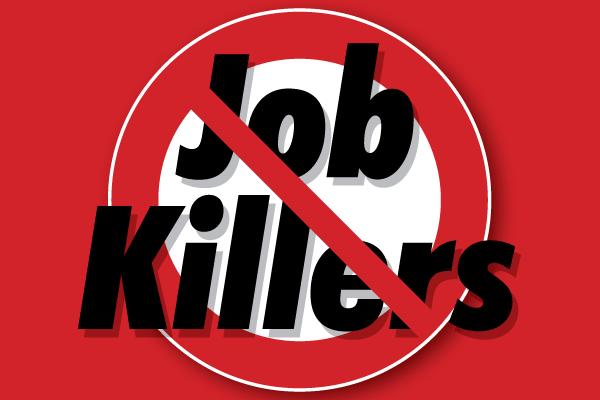News from: CalChamber
Strong opposition from the California Chamber of Commerce helped to stop five job killer bills from advancing in the state Legislature. The bills failed a key deadline to move from policy committee to fiscal committee on April 30.
In addition, the CalChamber has removed the job killer tag on five bills due to amendments.
For a complete list of this year’s job killers, visit www.calchamber.com/jobkillers.
Job Killers Stopped
The job killer fiscal bills that missed the deadline to pass out of the policy committee are:
• AB 1295 (Muratsuchi; D-Torrance) Housing Development Ban: Would have removed local land use authority and exacerbated the housing crisis by prohibiting cities and counties from entering into a residential development agreement in Very High Fire Severity Zones, which would have stripped local communities of their land use authority and applied a one-size-fits all ban on development throughout large swaths of California. In Assembly Local Government Committee. Failed deadline to move from policy committee to fiscal committee, April 30, 2021.
• AB 1400 (Kalra; D-San Jose) Government-Run Health Care: Would have eliminated private insurance and choice-based health care by creating an exorbitantly expensive new state-run health care system that would have cost California more than $400 billion, which ultimately would have been funded by taxpayers, and delayed access to providers, diminished quality of health care, and eliminated jobs in California. Failed deadline to move from policy committee to fiscal committee, April 30, 2021.
• SB 55 (Stern; D-Canoga Park) Housing Development Ban: Would have removed local land use authority by prohibiting any residential or commercial construction in either Very High Fire Severity Zones or State Responsibility Area, which would have effectively banned development activity in 1/3 of the state of California and exacerbated the existing housing crisis. In Senate Governance and Finance Committee. Failed deadline to move from policy committee to fiscal committee, April 30, 2021.
• SB 467 (Wiener; D-San Francisco) Oil and Gas Development Ban: Would have eliminated thousands of high-paying California jobs and required California to import even more foreign oil by shutting down approximately 95% of oil and gas production in California. Failed passage in Senate Natural Resources and Water Committee, April 13, 2021.
• SB 499 (Leyva; D-Chino) Housing Development Ban: Would have prohibited cities and counties from designating any land uses that have potential to adversely impact disadvantaged communities, even if any potential impacts could be mitigated. In doing so, the bill would have removed local land use authority, created new costly California Environmental Quality Act (CEQA) litigation and worsened the state’s housing crisis. In Senate Governance and Finance Committee. Failed deadline to move from policy committee to fiscal committee, April 30, 2021.
Job Killer Tag Removed
The job killer tag was removed from the following bills:
• AB 1003 (Lorena Gonzalez; D-San Diego) Criminal Liability for Good Faith Mistakes: Prior to amendments, would have proposed to criminalize small employers, managers, and supervisors, who in good faith, make a mistake in the application of the law, that even the Labor Commissioner and the courts disagree with on how to interpret. Job killer tag and opposition removed due to April 22, 2021 amendments narrowing the application of the bill to only criminalize fraudulent and knowingly unlawful conduct by bad actors.
• AB 1041 (Wicks; D-Oakland) Significant Expansion of Family Leave and Paid Sick Leave: Prior to amendments, would have significantly expanded multiple existing leave requirements in California that apply to employers of five or more, including small employers with limited employees who are struggling as a result of the pandemic, by allowing an employee to take leave to care for any family member or any person of their choosing without limitation, and subjecting the employer to costly litigation under the Fair Employment and Housing Act or the Labor Code Private Attorneys General Act (PAGA), for any alleged interference, interruption, discouragement, or denial. Job killer tag removed due to April 22, 2021 amendments narrowing the bill so that the only additional persons that an employee can take leave to care for is one designated person per 12-month period.
• AB 1074 (Lorena Gonzalez; D-San Diego) Onerous Return to Work Mandate: Prior to amendments, would have imposed an onerous and stringent process that is unlimited in time for specific employers to return employees to the workforce for specified industries, including hotels and restaurants that have been disproportionally impacted by this pandemic, which would have delayed rehiring and employers’ ability to re-open after being forced to close or reduce operations due to COVID-19. Job killer tag removed due to April 19, 2021 amendments eliminating COVID-19 related recall provisions from the bill.
• AB 1465 (Reyes; D-San Bernardino) Workers’ Compensation: Medical Provider Networks: Prior to amendments, would have mandated the creation of state-run Medical Provider Network for workers’ compensation claims, which would have imposed millions of dollars of costs on the current system as well as the state while reducing injured workers’ access to quality care. Job killer tag and opposition removed due to April 26, 2021 amendments narrowing the bill to only require a study of access to workers’ compensation care in medical provider networks.
• SB 606 (Lena Gonzalez; D-Long Beach) Expansion of Cal/OSHA Authority and Enforcement: Significantly expands Cal/OSHA authority by creating new “egregious employer” category in Labor Code, creates a new category of “enterprise-wide” citations that face different appeal and abatement practices. Finally, creates multiple new presumptions of retaliation that are duplicative of existing protections and will generate litigation. Job killer tag removed due to March 25, 2021 amendments limiting certain overbroad provisions, but CalChamber remains opposed due to structural changes to Cal/OSHA enforcement.
